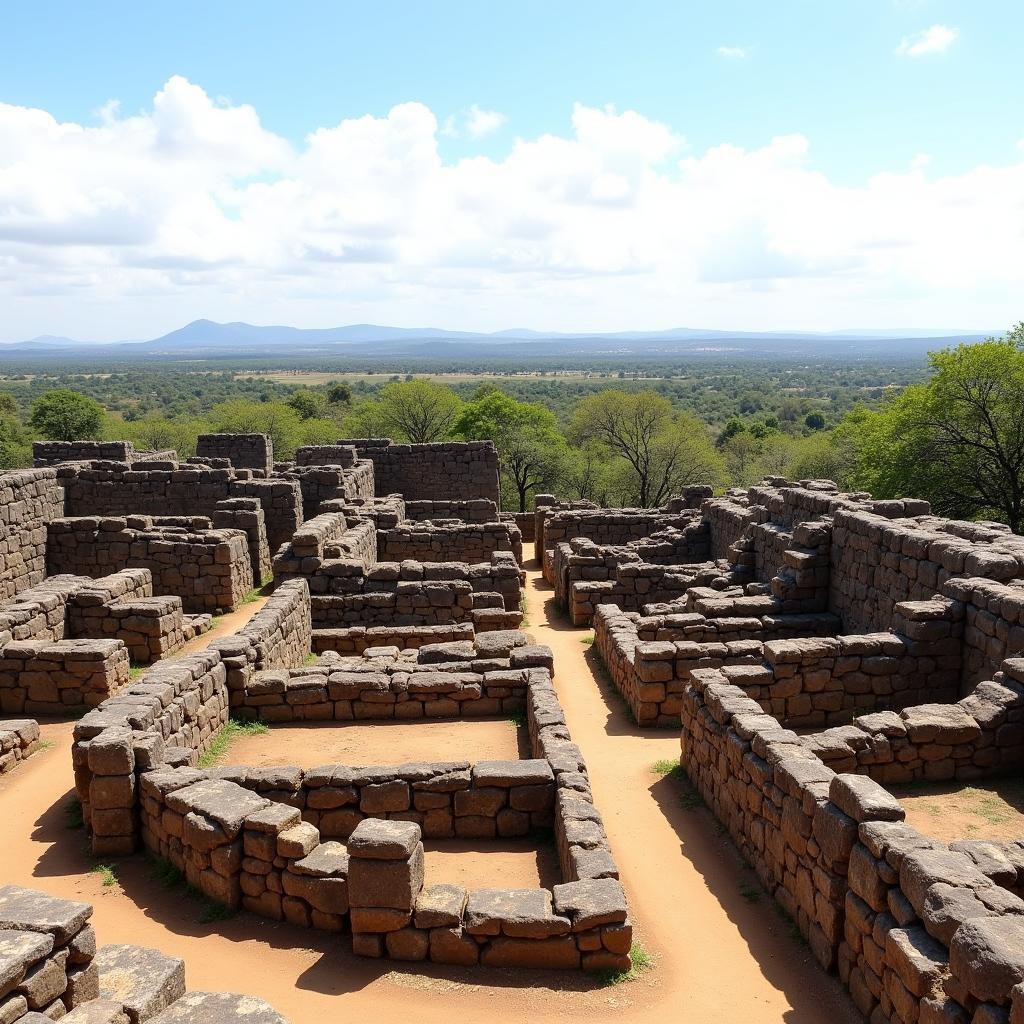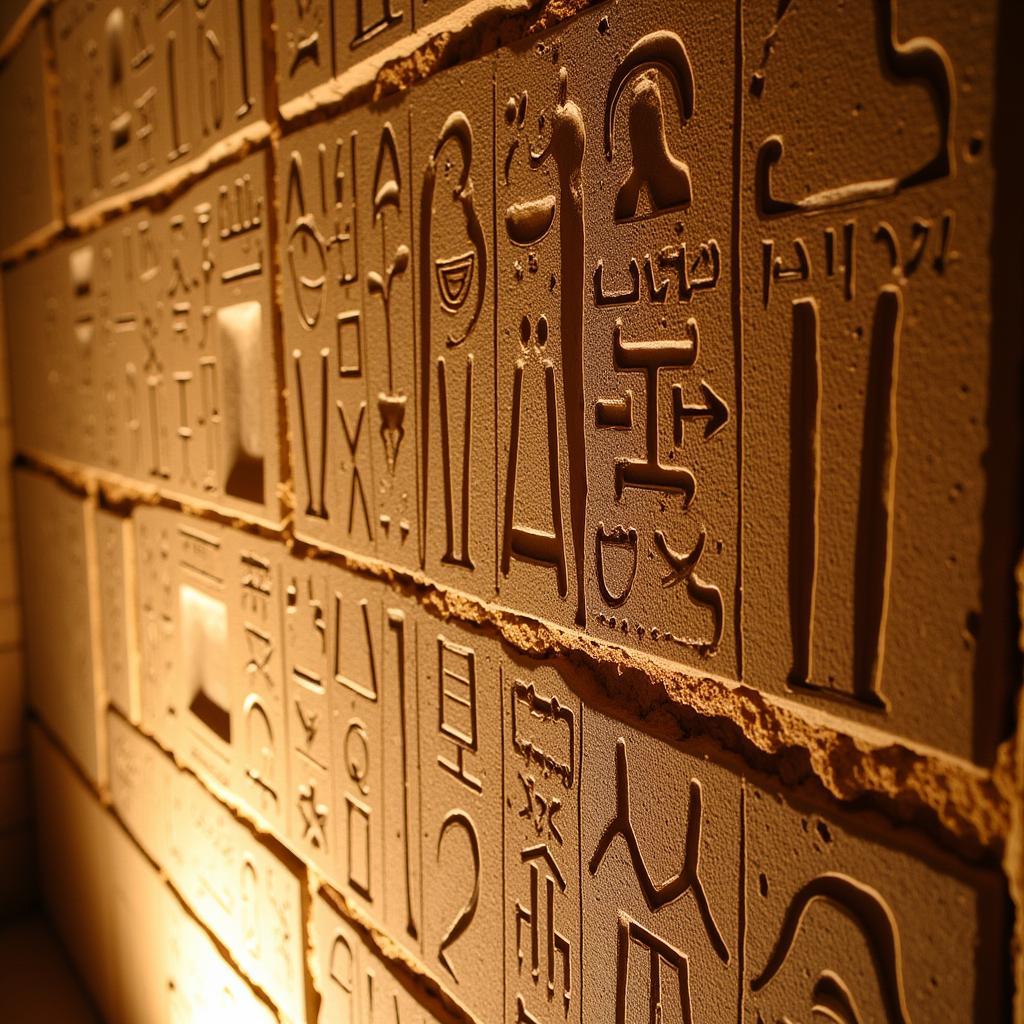Uncovering the Past: A Journey into African Archaeology
African Archaeology offers a captivating window into the vast history and rich cultural tapestry of the continent. It’s a field teeming with discoveries, challenging long-held assumptions and shedding light on civilizations that thrived millennia ago. From the ancient Egyptians to the Great Zimbabwe, Africa boasts an archaeological record as diverse and fascinating as its people.
Delving into Africa’s Ancient Civilizations
Archaeological sites are scattered across the African landscape, whispering tales of bygone eras. These remnants of the past, often buried beneath layers of time, offer invaluable clues to how ancient African societies lived, interacted with their environment, and shaped the course of history.
 Great Zimbabwe Ruins
Great Zimbabwe Ruins
One such site is the UNESCO World Heritage site of Great Zimbabwe. This sprawling complex, with its towering walls meticulously constructed from granite blocks, speaks volumes about the architectural prowess and sophisticated social organization of the Shona people, who inhabited the region between the 11th and 15th centuries. The site’s grandeur continues to inspire awe, standing as a testament to a powerful African kingdom that once dominated trade routes and fostered cultural exchange.
Unraveling the Mysteries of Ancient Egypt
Perhaps no other civilization on Earth has captured the imagination quite like ancient Egypt. The pyramids of Giza, the enigmatic Sphinx, and the treasure-laden tomb of Tutankhamun have captivated the world for centuries. Egyptian archaeology delves into the intricacies of this ancient civilization, exploring their religious beliefs, social structures, artistic expressions, and advanced understanding of mathematics, astronomy, and medicine.
 Egyptian Hieroglyphs on a Tomb Wall
Egyptian Hieroglyphs on a Tomb Wall
From deciphering hieroglyphics to excavating royal tombs, archaeologists meticulously piece together the story of ancient Egypt, revealing a civilization that flourished for over three thousand years, leaving an indelible mark on human history.
Beyond the Pyramids: Exploring Diverse Cultures and Kingdoms
While ancient Egypt often takes center stage, African archaeology encompasses a far broader spectrum of cultures and time periods. In West Africa, the remnants of the ancient Ghana Empire, renowned for its wealth in gold, provide insights into trans-Saharan trade routes and the rise of powerful kingdoms south of the Sahara Desert.
Meanwhile, archaeological discoveries in the Cradle of Humankind, located in South Africa, push back the timeline of human evolution, providing invaluable fossils and artifacts that illuminate our earliest ancestors and the dawn of humanity.
Facing the Challenges and Ethical Considerations
African archaeology faces unique challenges. The sheer vastness of the continent, coupled with limited resources and political instability in certain regions, can hinder research efforts.
Moreover, the field grapples with ethical considerations, particularly concerning the repatriation of artifacts and the involvement of local communities in archaeological projects. Recognizing the injustices of the past, when countless artifacts were removed from Africa and housed in museums across Europe and North America, there’s a growing movement to ensure that African nations have a voice in how their cultural heritage is studied and preserved.
African Archaeology: A Window to the Past, a Bridge to the Future
African archaeology is a dynamic and ever-evolving field, constantly challenging our understanding of the past and offering fresh perspectives on the history of humanity. By unearthing the secrets buried beneath the sands of time, we gain a deeper appreciation for the ingenuity, resilience, and cultural richness of African civilizations throughout the ages. As research continues, we can expect even more fascinating discoveries that will illuminate the past and shape our understanding of the present and future.
FAQs about African Archaeology
1. What are some of the most significant archaeological discoveries in Africa?
Africa boasts numerous groundbreaking discoveries, including the fossils of Lucy (Australopithecus afarensis) in Ethiopia, the ancient city of Carthage in Tunisia, and the rock art of the San people in Southern Africa.
2. How can I get involved in African archaeology?
Many universities and organizations offer opportunities for students and volunteers to participate in archaeological digs and research projects in Africa.
3. What is the oldest known archaeological site in Africa?
The Olduvai Gorge in Tanzania is considered one of the most important paleoanthropological sites globally, with evidence of early hominid activity dating back millions of years.
4. What is the role of technology in modern African archaeology?
Modern archaeologists utilize cutting-edge technologies like LiDAR (Light Detection and Ranging), ground-penetrating radar, and DNA analysis to uncover and analyze archaeological remains with greater precision and detail.
5. How does African archaeology contribute to our understanding of human evolution?
Discoveries in Africa, such as the fossils of early hominids and the tools they used, have been instrumental in reconstructing the timeline of human evolution and understanding the origins of our species.
Need More Information?
For further inquiries or assistance, please contact us at:
Phone: +255768904061
Email: [email protected]
Address: Mbarali DC Mawindi, Kangaga, Tanzania
Our dedicated customer support team is available 24/7 to assist you.